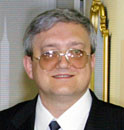On the Occasion of Daisaku Ikeda's 80th Birthday
Professor Mikhail E. Sokolov
Moscow State University
I would like to express my heartfelt felicitations on this very auspicious day, which is cherished by Japanese people because the number "eight" signifies ever-expanding prosperity.
An anniversary of someone like Daisaku Ikeda is undoubtedly a day to be celebrated by the world, for his activities touch the hearts of all people. Modern historians and philosophers are compelled to speak on the historical significance of the thoughts and ideals that Dr. Ikeda has brought to the world.
Dr. Ikeda kindled hope in the hearts of Japanese people devastated by the ravages of World War II and fascist militarism, and provided visionary inspiration for reconstruction. Today, the time has come for leaders of Japan, which has since become a developed country, along with other countries, to take heed of his philosophy of virtue.
Dr. Ikeda is making invaluable contributions to modern thought and philosophy, the development of culture and the arts, and the creation of a new future for education.
The magnitude of his achievements over the eighty years of his life has truly been impressive.
He developed an integrated system of Soka education that embodies the educational philosophy of Presidents Tsunesaburo Makiguchi and Josei Toda. It is a system that goes beyond students merely acquiring knowledge; it also provides a humanistic education in which each student assumes central importance and is instilled with humanistic principles . . .
Humanism and the love of humanity are themes that consistently underlie Dr. Ikeda's entire body of literary work. The Soka Gakkai members who draw inspiration from his writings are able to develop inner fortitude and lay a philosophical foundation in their lives, which will help them surmount adversity in times of difficulty.
He also exemplifies the individual who is dedicated to his mentor. The Tokyo Makiguchi Memorial Hall, which he had built, for example, stands as an epitome of a disciple succeeding his mentor's spiritual legacy.
Perhaps it may not be possible to fully appreciate the significance of the eminent activities of Dr. Ikeda in our lifetime. We may have to leave it to future generations to reach a truly just evaluation . . .
As a Russian, moreover, I believe Dr. Ikeda has helped to advance the ideas of the iconic author of my country, Leo Tolstoy. Through numerous discussions on Tolstoy, Dr. Ikeda has actually revealed profound philosophical aspects of the author that no Tolstoy researcher has been able to reach. Nonviolence is central to Tolstoy's beliefs. He asserted that violence is not only incapable of extirpating iniquity but will help fuel it instead.
While Tolstoy's thought spread among people, it was not able to develop into a broad popular movement that could transform society.
Dr. Ikeda's philosophy, however, possesses the power to realize such transformation and the underlying principles necessary to achieve it.
Tolstoy contended that the causes of personal misery lie not only with the individual but also with the social environment in which he lives. The writer sought out social iniquities and denounced them.
Dr. Ikeda has taken it further by pursuing ways through which we can transform such iniquities and making the path to transformation widely accessible to people. In that sense, I think that Dr. Ikeda's insights into the relationship between society and human beings are much deeper than Tolstoy's.
And the activism of the Soka Gakkai International under Dr. Ikeda's leadership clearly demonstrates that lofty ideals can be achieved and applied in the real world.
Do ideals exist in a vacuum? Or is there a movement that can translate them into tangible human endeavor? That is the crucial question.
In addition, Dr. Ikeda has fostered many individuals who are capable of carrying forward his spiritual legacy. The power of his philosophy to re-inspire people has enabled his disciples to tap their full potential . . .
There are two kinds of people in this world: Those who care only for their personal happiness, and those who find happiness in the happiness of others.
Dr. Ikeda finds happiness in the happiness of all people, and has devoted himself to this end. I therefore must pray for Dr. Ikeda's well-being, for his happiness is proof that humanity itself is happy.
I sincerely hope that he will continue his work filled with vigor and vitality, and for as many people as possible to meet him and be inspired by his philosophy through his writings and photographs.
Mikhail E. Sokolov is a professor at M.V. Lomonosov Moscow State University in Russia. He is department chair of national administration and insurance management. His research interests focus on vascular pathology.
[Taken from a message published in the January 10, 2008, issue of the Seikyo Shimbun, Soka Gakkai, Japan]
Share this page













